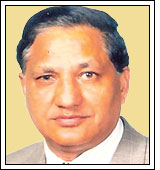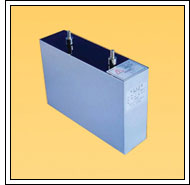 — Subhash C. Gupta,
Managing Director, Standard Capacitors
Standard Capacitors
— Subhash C. Gupta,
Managing Director, Standard Capacitors
Standard Capacitors has been serving the industry for over three
decades with energy-efficiency products like PFC capacitors,
automatic power factor correction panels, APFC relays, energy
storage capacitors, HT capacitors, etc.
Subhash C. Gupta gives
keen insights into the capacitor industry and sees how India’s
energy-efficiency consciousness is bound to drive up demand.
Apart from expounding on key industry challenges, he shares his
view on China’s role in the global electrical equipment industry. An
interview by
Venugopal Pillai.
Standard Capacitors has been in the business for over 30 years
now. Tell us in brief how the company’s product range has grown
over these years.
Yes, Standard Capacitors has been in business for over 36 years
now. We have grown from a humble beginning to gain respectable
place in capacitor business. We have diversified in real time power
factor correction systems, medium voltage capacitor installations
and MV APFC systems. We undertake turnkey jobs for power
factor correction in all voltages ranges and KVAr ratings.
Automatic power factor correction (APFC) systems are gaining
important as they help in achieving power factor of “unity”. Tell us
about the growing role of APFC systems and how Standard
Capacitors plans to capture an increasing market share.
In last few years there has been increase of non-linear loads like
variable speed drives, UPS and computers in many industrial and
office electrical network. These non-linear loads generate current
and voltage harmonics. PF improvement in these conditions
become difficult as capacitors get overloaded because of
harmonics and their application also may result in resonance
conditions, making the condition worse.
There is often felt a need of a very reliable PF correction
capacitor that shall not only withstand high RMS current but also
offer long operational life under sustained harmonics overloads.
We are in line with the latest trends in this industry. Automatic
power factor correction is our specialization. We have adopted
real time power factor correction technology for faster correction
of power factor, especially in industries where load is fast
changing, as contactor-based switching system cannot keep pace
with changing load. Besides, zero switching with thyristor based
power factor correction systems ensures longer life of capacitors
and switching equipment.
It is felt in industry circles that the government should provide
subsidy to those electricity consumers that maintain a high power
factor. What is your view?
In fact, almost all electric supply establishments are offering
incentives for higher power factor. By way of reduction in
maximum demand charges and rebate for crossing the upper limit
of power factor right up to unity power factor. Also billing is done
on KVAHr basis which prompts customers to maintain high power
factor so as to keep the number of units consumed at low level.
What are the challenges faced by Indian capacitor manufacturers
and what remedial measures could the government adopt?
Competition is on the rise as capacitors manufacturers cut prices
to retain market share. Although the market is growing, so are the
challenges. Companies that want to survive in the marketplace
must begin to employ new competitive strategies to stay ahead.
An efficient power supply system is a key requirement for a
nation‘s economic growth and good quality life of its citizens.
Assured availability of quality power at a reasonable cost will not
only act as a catalyst in the socio-economic development of the
country, but also enhance the global competitiveness of the
industrial sector. It will also lead to enhanced employment
generation and per capita income levels. Rapid development of a robust and healthy domestic electrical equipment industry,
supporting he complete value chain in power generation,
transmission and distribution, is not only crucial for the economy,
but is also of strategic importance for India.
The capacitor industry has a diversified, mature, and
established manufacturing base, which has the potential to meet
the current as well as future domestic and export demands based
on the power sector‘s growth projections. However, increasing
challenges from the supply and demand side and international
competition has started to impact the health of this important
industry. The current scenario has necessitated that the
government develop a well-defined, robust plan to support the
long-term growth of this industry.
What is your view about competition from China?
We are not all racing to learn Mandarin yet, but most, if not all,
working-age adults in the Western world and many developing
nations, know enough to keep an eye on news about and from
China. For executives in all industry segments, China is the
elephant in the room! It must be factored into any decisions about
the future of their enterprise.
If any segment of the global economy can afford to ignore
China’s gargantuan role, it’s not electrical! Over the last two
decades, the industry has steadily and tightly yoked itself to the
Asian nation. In the last five years alone, China has set numerous
records in high-tech market share. It has become the world’s
biggest consumer of semiconductor products and a wide range of
power equipment including capacitors. By the way, it is just getting
warmed up. As its middle class expands over the next decade—
barring any geopolitical disruptions—China will overtake the
western world and become the leading market for electrical
equipments and a range of other goods.
Tell us about your export business.
At present we do not have an export market but we will venture in
to it shortly.
 We loosely understand that the use of motor-based consumer
appliances can cause “reactive” power leading to inefficiency in
power consumption. Please explain this phenomenon in brief and
the role of capacitors in remedying the situation.
We loosely understand that the use of motor-based consumer
appliances can cause “reactive” power leading to inefficiency in
power consumption. Please explain this phenomenon in brief and
the role of capacitors in remedying the situation.
Motors work because of a linkage between the sinusoidal
magnetic flux in the stator with the flux induced in the rotor.
Synchronous machines use DC voltage to excite a fixed magnetic
flux that locks in with the varying stator flux and applies a torque to
the machine shaft. Induction motors have no exciter on their
rotors; they have conducting bars arranged like a "squirrel cage"
that circulate current induced by the stator flux that also
establishes a flux for the rotor and a torque on the shaft. Induction
machines by their nature have "lagging" power factors. All but the
largest motors are induction machines. All the motors in home
appliances, like washing machines, refrigerators, dishwashers,
etc, are induction motors. Single-phase induction motors cannot
start up by themselves; they need two stator fluxes with a phase
angle between them (the angle between phases on a three-phase
system is 120 degrees). The capacitor is tied in series with a
second starter winding.
The capacitor shifts the phase angle in that winding enough to
provide the torque to get the motor rolling, and is often opened
after started. So this capacitor is not used for power factor
correction. Thus the domestic appliance motors do contribute to
fall in power factor. But since the household are charged on the
basis of KWHr (and not KVAHr), improvement of power factor by
installation shunt capacitors will not help in saving of electricity
bills. At the most some single phase capacitor can be installed at
the main circuit to improve voltage regulation.
In a general sense, what would be the growth drivers for the
Indian power capacitor industry in the years to come?
Almost all the electricity authorities have now made it compulsory
to install LT power capacitors in the case of all industrial loads.
This implies that for every induction motor, LT power capacitor is
a must. Due to massive rural electrification and use of electric
pumps in irrigation and industrial purposes the motor load is
increasing day by day and so is the demand for power capacitors.
Please tell us your company’s growth plans.
We intend to develop our business in the MV capacitor range with
the inclusion of MV APFC panels, switched capacitor banks, and
real-time power factor control panels.
In a broad sense, do you think that as a nation India has the
technological ability to make sophisticated capacitors?
India has capability to make sophisticated capacitors.
Department of Heavy Industry has decided to develop a 10-year
Mission Plan (2012-22) for the Indian electrical equipment
industry. The Mission Plan will have recommended interventions
aimed at enhancing the technical strengths of the industry. Its
objective is to develop a strategic plan of action, with full
participation of the stakeholders, to remove obstacles in the
growth path of the industry. Given this scenario, many capacitor
manufacturers will come forward to invest in growth of
specialized capacitors to decrease dependence on import of
certain types of capacitors.